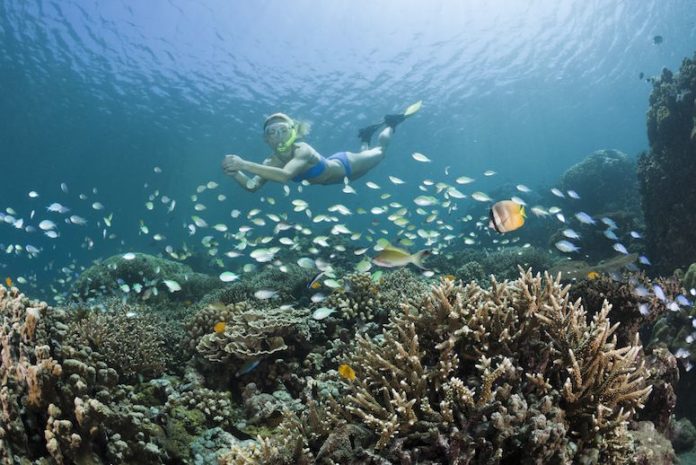
An ingredient commonly found in many popular sunscreens may contribute significantly to coral die-offs, according to a study published October 20. Oxybenzone, a chemical found in Aveeno and Neutrogena sunscreens, among many other brands, is an endocrine disruptor and damages the corals’ DNA, even causing young coral to essentially commit suicide. Perhaps most troubling of all is the study found this to be true even with very trace amounts of oxybenzone; 62 parts per trillion – or roughly one drop of water in 6.5 Olympic swimming pools – is enough to damage baby coral.
According to the United States National Park Service, between four to six thousand tons of sunscreen will enter coral reef areas each year.
“We’ve lost about 90 percent of coral reefs in U.S. territorial waters. These chemicals are having an impact on conch, shrimps, arthropods, and cuttlefish—pretty much everything in the water,” said one of the study’s authors, molecular biologist Craig Downs of the Haereticus Environmental Laboratory. “It may be that oxybenzone makes the baby corals encase themselves in their own skeletons, creating their own coffins…In the presence of oxybenzone, baby corals basically kill themselves.”
While coral reefs may be few and far between, they are typically a hotbed teeming with life, a microcosm of the oceanic food chain. When they die off, it endangers all the species who thrived there.
The good news is it isn’t over yet, the damage is not completely done, and the more people become aware of this harmful ingredient, the more it can be avoided. A bevy of companies offer sunscreens without oxybenzone; Jason offers a SPF 30 mineral sunscreen with broad spectrum protection, Badger makes a whole range of bug sprays and sunscreens that are reef-safe and cruelty-free and Caribbean Solutions has an entire line of biodegradable sun care. When shopping for UV protection, look for the phrase “reef safe” or “biodegradable” as good indicators of environmentally responsible products, and eschew those with ingredients that are toxic to aquatic habitats, and hopefully our collective drops in the ocean will lead to a healthier, more sustainable situation for all.
This Article (Sunscreen vs. Coral Reefs) is free and open source. You have permission to republish this article under a Creative Commons license with attribution to the author and AnonHQ.com.




